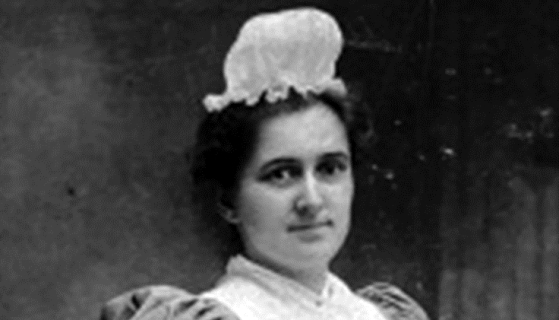Between the comfortably named districts of Parkwoods and Pleasant View to the north of central Toronto, right by the Ontario Highway 401, are the St. Mary Armenian Church, the Armenian Community Centre of Toronto and the Sara Corning Centre for Genocide Education. The latter, dedicated to research and education in the field of human rights and Genocide, is named for the Canadian nurse who helped to save 5,000 Armenian orphans from the destruction of Smyrna in present day Turkey’s Izmir region, in 1922. Though it was the most momentous, this was not her only humanitarian triumph.



Sara Corning, as it says on her gravestone, "lived to serve others."
Corning was born in southeastern Canada in 1872, trained as a nurse in the United States and joined the U.S. Red Cross during World War I. She learned of the Armenian Genocide and its repercussions from the Canadian press.
In 1921 Corning arrived in Turkey to take charge of an orphanage at the foot of Mount Ararat. The following year, Turkish forces savagely retook the disputed port town of Smyrna, driving Greek inhabitants and refugee Armenians before them. Corning signed up for Near East Relief, and in Constantinople boarded an American destroyer bound for the beleaguered port.
On arrival she and two other like-minded souls set up a clinic to tend to the sick and wounded, which was swiftly closed down by Ottoman troops. A second clinic was also quickly closed, with heavier threats. “After that, the city was looted, then they began to burn it down," Corning wrote years later. With thousands dying in the fires, charitable organizations including Near East Relief organized an evacuation by sea. Corning turned to an orphanage run by an American nurse and began shepherding children to the docks. Amid the flames and death and confusion, 5,000 children were saved.

Corning travelled with these children to Greece, where she established an orphanage and set about their education and upbringing.
In 1923 King George II of Greece invited Sara Corning to his palace to bestow on her the nation's highest honor, the Silver Cross of the Savior. The following year, again displaying a no-nonsense approach that left no space for bitterness or prejudice, she returned to Turkey, where she worked as a teacher until her retirement. She returned to the Canadian home in which she was raised and lived there until her death aged 97 in 1969. The most frequently reproduced photograph of Sara Corning shows a handsome woman in an immaculate nurse's uniform and frilled cap. She has a half-smile and a level, compassionate gaze in which an undertone of steel can definitely be detected.
Images courtesy of the Armenian Genocide Museum-Institute and Yarmouth County Museum, Canada.
The story is verified by the 100 LIVES Research Team.




